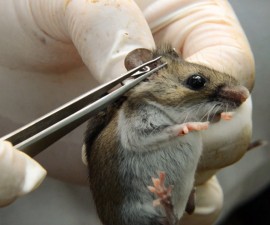(单词翻译:单击)
JOHN YANG: But first: Lyme disease is on the rise. It's being spread by a growing tick population and has become a particular problem for the Massachusetts islands of Nantucket and Martha's Vineyard.
But an MIT scientist thinks he might have a long-term solution, and it comes from where you might least expect it.
From PBS station WGBH in Boston, Cristina Quinn reports.
CRISTINA QUINN: On the island of Nantucket, people walk their dogs and runners weave their way down the trail of Ram Pasture. It's a popular spot, and it's easy to see why. Hundreds of acres of untouched conservation land surround the trails. It's a peaceful setting where deer are often spotted in the early hours grazing.
It's also lush territory for ticks.
ROBERTO SANTAMARIA, Director, Nantucket Health Department: If you're in an area like this, you want to stay on the beaten path to stay away from the tall grass. Right now, it's a nice, cool day. We had rain last night. It's perfect tick questing season.
CRISTINA QUINN: Roberto Santamaria would know. As director of the Health Department, he's familiar with the concerns of the community; 40 percent of Nantucket's 10,000 year-round residents have either had Lyme disease or are currently afflicted.
ROBERTO SANTAMARIA: It's become part of their daily life here. Every time you go out, you go to a pasture, you go to a hike, you go to the beaches into the dunes even, you want to go home and do a tick check.
Tick checks are pretty arduous, and they take a while, and even then, you don't even catch all the ticks. So it's a big burden.
CRISTINA QUINN: The problem isn't unique to Nantucket and Martha's Vineyard. A study last year from the Centers for Disease Control illustrates the spread of the tick population nationwide over the last two decades.
The northern part of the U.S. has seen a significant spike. And MIT scientist Kevin Esvelt says the solution may start with one of the main culprits, mice.

KEVIN ESVELT, Massachusetts Institute of Technology: Mice are a problem. You might say, what do mice have to do with Lyme disease?
Well, ticks aren't born infected. They get infected when they bite an infected host, which is usually a mouse.
CRISTINA QUINN: The white-footed mouse, to be exact.
Scientists aren't sure why, but these Northeast natives are more susceptible to contracting Lyme disease than any other animal around here. They are also abundant. Esvelt's solution? Genetically engineer them so that their immune response prevents them from being infected.
KEVIN ESVELT: So, our idea is, well, how about we take mice that are naturally immune, identify the DNA in their genomes that makes them immune, and then take the best such elements and put them all into one engineered strain of mice?
CRISTINA QUINN: He and his team would do this using gene editing technology. But to really make a difference, it's going to take a lot of mice.
KEVIN ESVELT: So, we're talking maybe up to 100,000 mice on each island.
CRISTINA QUINN: The idea is that when the genetically engineered mice mate with the native mice, their offspring would also be immune to Lyme disease. Over time, this would reduce the prevalence of the disease.
But how do Nantucket residents feel about releasing 100,000 genetically engineered mice onto the island? For longtime resident and town selectman, Jason Bridges, his initial reaction was one of disbelief.
JASON BRIDGES, Nantucket Selectman: It sounded like a bad sci-fi movie, and people kind of laughed. But the more presentations that we have in front of the Board of Selectmen, articles in the newspaper, people like, oh, this is a really — this is a real thing.
I think everyone is getting used to the idea. But the initial visceral reaction was, serious? Are you serious about that?
CRISTINA QUINN: If all goes as planned, it will be seven years until these resistant mice are released. But the town is so serious, it has formed a steering committee to work closely with Esvelt on best practices.
Esvelt expects there will be opponents along the way, but he welcomes skepticism and says he thinks major scientific endeavors like this need to be as transparent as possible.
KEVIN ESVELT: I'm particularly passionate about that, because I view this as an opportunity to work out how we, as a society, are going to handle these technologies.
I mean, we have certainly been able to engineer the environment before. It's just, we tend to do it with bulldozers or spraying lots of chemicals.
CRISTINA QUINN: For the PBS NewsHour, I'm Cristina Quinn on Nantucket.


